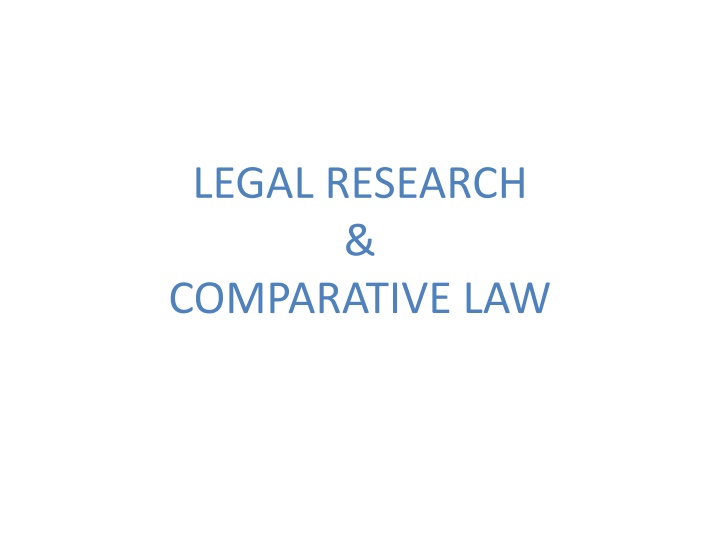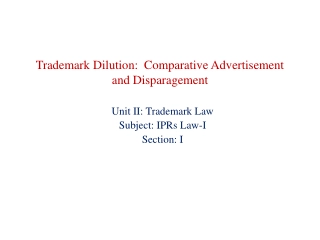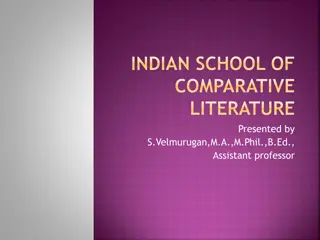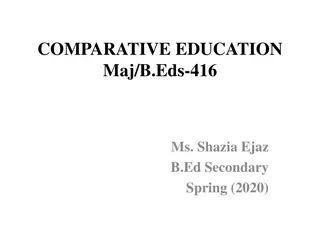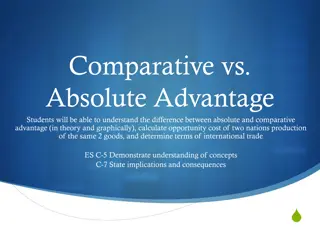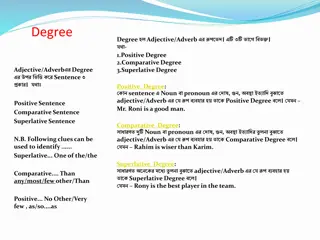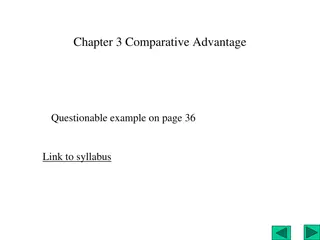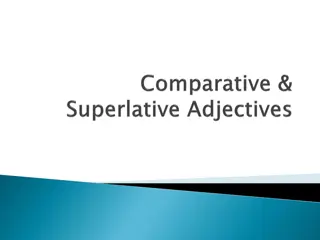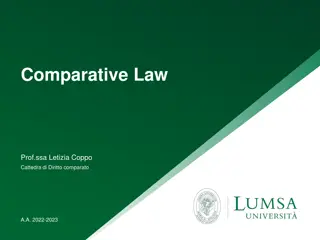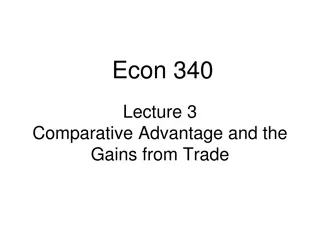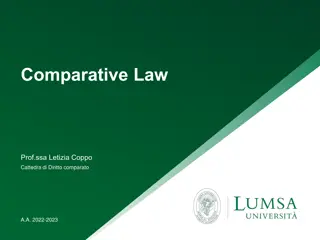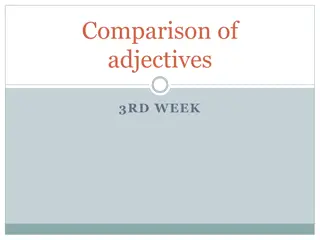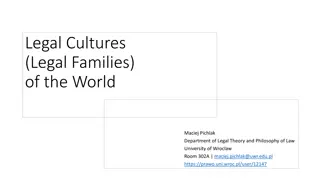Comparative Law: Research, Analysis, and Resources
Explore the world of comparative law through research and study of legal systems, including Italian and foreign laws. Delve into comparative legal analysis, characteristics of legal systems, and the study of legal sources. Discover in-depth insights from a variety of books and academic journals, as well as organizations and research centers dedicated to comparative law.
Download Presentation

Please find below an Image/Link to download the presentation.
The content on the website is provided AS IS for your information and personal use only. It may not be sold, licensed, or shared on other websites without obtaining consent from the author.If you encounter any issues during the download, it is possible that the publisher has removed the file from their server.
You are allowed to download the files provided on this website for personal or commercial use, subject to the condition that they are used lawfully. All files are the property of their respective owners.
The content on the website is provided AS IS for your information and personal use only. It may not be sold, licensed, or shared on other websites without obtaining consent from the author.
E N D
Presentation Transcript
LEGAL RESEARCH & COMPARATIVE LAW
Introduzione Ricerca orientata allo studio del diritto comparato: - diritto italiano; - diritto Straniero; - analisi comparatistica. Caratteri dei sistemi giuridici Sistema delle fonti Ricerca
Approfondimenti di diritto comparato: Libri - - - - - DAVID R., and JAUFFRET-SPINOSI C., Les grands syst mes de droit contemporains; ZWEIGERT K., K TZ H., Einf hrung in die Rechtsvergleichung; GUTTERIDGE H. C., Comparative law; SCHLESINGER R., Comparative law: cases, text, materials; VON MEHREN A. T., The civil law system: cases and materials for the comparative study of law; BOGDAN M., Comparative law; De CRUZ P., A modern approach to comparative law; De CRUZ P., Comparative law in a changing world; GLENDON M., et al, Comparative legal traditions: text, materials, and cases on western law; GLENN H P., Legal traditions of the world; LEGRAND P., MUNDAY R., Comparative legal studies: traditions and transitions; RILES A., Rethinking the masters of comparative law; SACCO R., La comparaison juridique au service de la connaissance du droit; WATSON A., Legal transplants: an approach to comparative law; ZIMMERMAN R.,REIMANN M., The Oxford handbook of comparative law. - - - - - - - - - -
Periodici American Journal of Comparative Law Bolet n Mexicano de Derecho Comparado Annuario di Diritto Comparato e di Studi Legislativi Comparative and international law journal of Southern Africa Comparative Law Yearbook of International Business European Journal of Comparative Law and Governance International and Comparative Law Quarterly Journal of Comparative Law Oxford University Comparative Law Forum Rabels Zeitschrift f r ausl ndisches und internationales Privatrecht Revue de droit international et de droit compar Revue internationale de droit compar Uniform Law Review / Revue de Droit Uniforme Zeitschrift f r vergleichende Rechtswissenschaft
Organizzazioni e Centri di ricerca International Academy of Comparative Law Argentina: Asociaci n Argentina de Derecho Comparado, Instituto de Derecho Comparado Enrique Mart nez Paz , Academia Nacional de Derecho y Ciencias Sociales de C rdoba. Australia: Centre for Comparative Constitutional Studies, Institute for International Law and the Humanities - University of Melbourne; Australian Institute of Comparative Legal Systems. Austria: sterreichische Gesellschaft f r Rechtsvergleichung, Institut f r Europarecht, Internationales Recht und Rechtsvergleichung - University of Vienna. Belgium: Centre de Droit Compar , d Histoire du Droit et d Anthropologie Juridique - Universit Libre de Bruxelles; Centre Interuniversitaire de Droit Compar . Brazil: Instituto de Direito Comparado Luso-Brasileiro. Canada: Institute of Comparative Law - McGill University; Paul-Andr Cr peau Research Centre for Private and Comparative Law, Canadian Association of Comparative Law; Association Qu b coise de Droit Compar . China: Chinese Society of Comparative Law. Denmark: Danske Komit for Komparativ Ret. France: Soci t de L gislation Compar e, Institut de Droit Compar de Paris - University of Paris Panth on Assas, Institut de Droit Compar Edouard Lambert - University Jean Moulin 3, Lyon; Centre Fran ais de Droit Compar , Groupement de Droit Compar . German: Gesellschaft f r Rechtsvergleichung - University of Freiburg; Max-Planck Institut f r ausl ndisches und internationales Privatrecht (Private Law and Private International law), Amburgo, Max-Planck Institut f r ausl ndisches ffentliches Recht und V lkerrecht (Comparative Public Law and International Law), Heidelberg, Berlin. Greece: Hellenic Institute of International and Foreign Law. Hong Kong: Centre for Chinese and Comparative Law - City University of Hong Kong.
India: National Committee of Comparative Law. Ireland: Irish Society of Comparative Law. Italy: Associazione Italiana di Diritto Comparato, Istituto di Diritto Comparato Angelo Sraffa - Bocconi; Associazione Diritto Pubblico Comparato ed Europeo. Japan: Japan Society of Comparative Law, Institute of Comparative Law in Japan - Chuo University; Waseda University Institute of Comparative Law. Norway: Norwegian Association for Comparative Law - University of Oslo. Mexico: Instituto de Investigaciones Juridicas - Universidad Nacional Autonoma de Mexico (UNAM); Academia Mexicana de Derecho Internacional Privado y Comparado. Netherlands: Nederlandse Vereniging voor Rechtsvergelijking (Netherlands Comparative Law Association) - Electronic Journal of Comparative Law; E.M. Meijers Institute for Legal Research - Universiteit Leiden. New Zealand: New Zealand Association of Comparative Law. Portugal: Gabinete de Documenta o e Direito Comparado. Russia: Institute of Legislation and Comparative Law under the Government of the Russian Federation. Serbia: Institut za Oporedno Pravo (Institute of Comparative Law). South Africa: Centre for Foreign and Comparative Law - University of South Africa, Pretoria. Spain: Instituto de Derecho Comparado - Universidad Complutense de Madrid. Instituto de Derecho Publico Comparado - Universidad Carlos III de Madrid. Institute of European and Comparative Private Law - University of Girona. Switzerland: Institut Suisse de Droit Compar . United Kingdom: British Institute of International and Comparative Law; British Association of Comparative Law; Institute of European and Comparative Law - University of Oxford; Institute of Global Law - University College London. United States: American Foreign Law Association, American Society of Comparative Law, Parker School of Foreign and Comparative Law - Columbia University, Eason Weinmann Center of Comparative Law - Tulane Law School.
Risorse Web Worldlii - World Legal Information Institute GLIN - Global Legal Information Network http://loc.gov/lawweb/servlet/GlinArchive? http://www.loc.gov/lawweb/servlet/Glic?home (US Library of Congress) Guide to Law Online (Library of Congress) https://h2o.law.harvard.edu/ https://law.justia.com/ GlobaLex
Ricerca e Diritto Comparato 1. Famiglie giuridiche e caratteri dei paesi di common e civil law; 2. Il sistema delle fonti 3. Modalit di ricerca all interno di ciascun sistema.
Fonti Civil Law i) Legge Scritta Costituzioni; Trattati e diritto comunitario; Leggi: Codici, leggi speciali; Regolamenti; Stile delle leggi: Regole generali e astratte
Ricerca Legislativa Codici e Leggi cartecei (biblioteca Luiss; Biblioteca di Camera e Senato); Italia: leggi, regolamenti, atti preparatori sui siti istituzionali: https://www.camera.it/leg18/141 http://www.senato.it/2867 http://www.governo.it/it/provvedimenti Normattiva http://www.normattiva.it/ Altri paesi: Francia: https://www.legifrance.gouv.fr/ Spagna: http://www.boe.es/ http://www.lexadin.nl/wlg/legis/nofr/eur/lxwespa.htm Germania: http://www.bundestag.de/en/ ; http://www.washlaw.edu/forint/europe/germany.html Unione Europea http://eur-lex.europa.eu/homepage.html
ii) Giurisprudenza Sistema articolato su tre livelli: 1 tribunali di prima istanza 2 Corti d Appello (riesame in fatto e diritto) 3 Corti Supreme (Corte di Cassazione, Cour de Cassation) Stile delle Sentenze: - impersonali, - decisione e motivazione dell intera corte, no opinioni dei singoli giudici; - Francia: sentenze concise, scarso peso ai fatti, no analisi della norma, no itinerario logico del giudice; - Altri paesi: argomentate, riferimenti al fatto, oltre che al diritto.
Ricerca Giurisprudenziale Repertorio del Foro Italiano (biblioteca). ItalGiureWEB: http://www.italgiure.giustizia.it/ Altri paesi: Germania: https://guides.ll.georgetown.edu/c.php?g=363443&p=2455 532 Francia http://www.legifrance.gouv.fr/ Spagna: http://www.poderjudicial.es/search/indexAN.jsp EU http://eur-lex.europa.eu/collection/eu-law/eu-case- law.html
iii) Dottrina No fonte Autorit persuasiva; Influenza codificazione, produzione legislativa, interpretazione.
Ricerca di Dottrina Mongrafia, articoli e saggi in riviste e volumi: cartacei in biblioteca e in formato elettronico (Risorse elettroniche) con accesso remoto (Servizio Proxybib): https://www.lumsa.it/ateneo_sba_cataloghi
Fonti Common Law i) Legge scritta Costituzione (UK-US); Leggi Statutes US competenza legislativa su due livelli: - Federale - Congresso su materie ex art. I Costit.; - Statale - singoli stati competenza residuale. Stile delle Leggi: norme dettagliate e casistiche, elenchi, definizioni.
Stile delle leggi, un esempio: Corporate Law Delaware http://delcode.delaware.gov/title8/c001/sc01/i ndex.shtml Italia http://www.normattiva.it/uri- res/N2Ls?urn:nir:stato:regio.decreto:1942-03- 16;262
Codice Civile Art. 2328. (Atto costitutivo) La societ deve costituirsi per atto pubblico. L'atto costitutivo deve indicare: 1) il cognome e il nome, il nome del padre, il domicilio, la cittadinanza e la razza dei soci, e il numero delle azioni sottoscritte da ciascuno di essi; 2) la denominazione, la sede della societ e le eventuali sedi secondarie; 3) l'oggetto sociale; 4) l'ammontare del capitale sottoscritto e versato; 5) il valore nominale e il numero delle azioni e se queste sono nominative o al portatore; 6) il valore dei crediti e dei beni conferiti in natura; 7) le norme secondo le quali gli utili devono essere ripartiti; 8) la partecipazione agli utili eventualmente accordata ai promotori o ai soci fondatori; 9) il numero degli amministratori e i loro poteri, indicando quali tra essi hanno la rappresentanza della societ ; 10) il numero dei componenti il collegio sindacale; 11) la durata della societ . Lo statuto contenente le norme relative al funzionamento della societa', anche se forma oggetto di atto separato, si considera parte integrante dell'atto costitutivo e deve essere a questo allegato.
Delaware Code - TITLE 8 Corporations CHAPTER 1. GENERAL CORPORATION LAW Subchapter I. Formation 102 Contents of certificate of incorporation. (a) The certificate of incorporation shall set forth: (1) The name of the corporation, which (i) shall contain 1 of the words "association," "company," "corporation," "club," "foundation," "fund," "incorporated," "institute," "society," "union," "syndicate," or "limited," (or abbreviations thereof, with or without punctuation), or words (or abbreviations thereof, with or without punctuation) of like import of foreign countries or jurisdictions (provided they are written in roman characters or letters); provided, however, that the Division of Corporations in the Department of State may waive such requirement (unless it determines that such name is, or might otherwise appear to be, that of a natural person) if such corporation executes, acknowledges and files with the Secretary of State in accordance with 103 of this title a certificate stating that its total assets, as defined in 503(i) of this title, are not less than $10,000,000, or, in the sole discretion of the Division of Corporations in the Department of State, if the corporation is both a nonprofit nonstock corporation and an association of professionals, (ii) shall be such as to distinguish it upon the records in the office of the Division of Corporations in the Department of State from the names that are reserved on such records and from the names on such records of each other corporation, partnership, limited partnership, limited liability company or statutory trust organized or registered as a domestic or foreign corporation, partnership, limited partnership, limited liability company or statutory trust under the laws of this State, except with the written consent of the person who has reserved such name or such other foreign corporation or domestic or foreign partnership, limited partnership, limited liability company or statutory trust, executed, acknowledged and filed with the Secretary of State in accordance with 103 of this title, or except that, without prejudicing any rights of the person who has reserved such name or such other foreign corporation or domestic or foreign partnership, limited partnership, limited liability company or statutory trust, the Division of Corporations in the Department of State may waive such requirement if the corporation demonstrates to the satisfaction of the Secretary of State that the corporation or a predecessor entity previously has made substantial use of such name or a substantially similar name, that the corporation has made reasonable efforts to secure such written consent, and that such waiver is in the interest of the State, (iii) except as permitted by 395 of this title, shall not contain the word "trust," and (iv) shall not contain the word "bank," or any variation thereof, except for the name of a bank reporting to and under the supervision of the State Bank Commissioner of this State or a subsidiary of a bank or savings association (as those terms are defined in the Federal Deposit Insurance Act, as amended, at 12 U.S.C. 1813), or a corporation regulated under the Bank Holding Company Act of 1956, as amended, 12 U.S.C. 1841 et seq., or the Home Owners' Loan Act, as amended, 12 U.S.C. 1461 et seq.; provided, however, that this section shall not be construed to prevent the use of the word "bank," or any variation thereof, in a context clearly not purporting to refer to a banking business or otherwise likely to mislead the public about the nature of the business of the corporation or to lead to a pattern and practice of abuse that might cause harm to the interests of the public or the State as determined by the Division of Corporations in the Department of State; (2) The address (which shall be stated in accordance with 131(c) of this title) of the corporation's registered office in this State, and the name of its registered agent at such address; (3) The nature of the business or purposes to be conducted or promoted. It shall be sufficient to state, either alone or with other businesses or purposes, that the purpose of the corporation is to engage in any lawful act or activity for which corporations may be organized under the General Corporation Law of Delaware, and by such statement all lawful acts and activities shall be within the purposes of the corporation, except for express limitations, if any; the 103 under
(4) If the corporation is to be authorized to issue only 1 class of stock, the total number of shares of stock which the corporation shall have authority to issue and the par value of each of such shares, or a statement that all such shares are to be without par value. If the corporation is to be authorized to issue more than 1 class of stock, the certificate of incorporation shall set forth the total number of shares of all classes of stock which the corporation shall have authority to issue and the number of shares of each class and shall specify each class the shares of which are to be without par value and each class the shares of which are to have par value and the par value of the shares of each such class. The certificate of incorporation shall also set forth a statement of the designations and the powers, preferences and rights, and the qualifications, limitations or restrictions thereof, which are permitted by 151 of this title in respect of any class or classes of stock or any series of any class of stock of the corporation and the fixing of which by the certificate of incorporation is desired, and an express grant of such authority as it may then be desired to grant to the board of directors to fix by resolution or resolutions any thereof that may be desired but which shall not be fixed by the certificate of incorporation. The foregoing provisions of this paragraph shall not apply to nonstock corporations. In the case of nonstock corporations, the fact that they are not authorized to issue capital stock shall be stated in the certificate of incorporation. The conditions of membership, or other criteria for identifying members, of nonstock corporations shall likewise be stated in the certificate of incorporation or the bylaws. Nonstock corporations shall have members, but failure to have members shall not affect otherwise valid corporate acts or work a forfeiture or dissolution of the corporation. Nonstock corporations may provide for classes or groups of members having relative rights, powers and duties, and may make provision for the future creation of additional classes or groups of members having such relative rights, powers and duties as may from time to time be established, including rights, powers and duties senior to existing classes and groups of members. Except as otherwise provided in this chapter, nonstock corporations may also provide that any member or class or group of members shall have full, limited, or no voting rights or powers, including that any member or class or group of members shall have the right to vote on a specified transaction even if that member or class or group of members does not have the right to vote for the election of the members of the governing body of the corporation. Voting by members of a nonstock corporation may be on a per capita, number, financial interest, class, group, or any other basis set forth. The provisions referred to in the 3 preceding sentences may be set forth in the certificate of incorporation or the bylaws. If neither the certificate of incorporation nor the bylaws of a nonstock corporation state the conditions of membership, or other criteria for identifying members, the members of the corporation shall be deemed to be those entitled to vote for the election of the members of the governing body pursuant to the certificate of incorporation or bylaws of such corporation or otherwise until thereafter otherwise provided by the certificate of incorporation or the bylaws; (5) The name and mailing address of the incorporator or incorporators; (6) If the powers of the incorporator or incorporators are to terminate upon the filing of the certificate of incorporation, the names and mailing addresses of the persons who are to serve as directors until the first annual meeting of stockholders or until their successors are elected and qualify.
(b) In addition to the matters required to be set forth in the certificate of incorporation by subsection (a) of this section, the certificate of incorporation may also contain any or all of the following matters: (1) Any provision for the management of the business and for the conduct of the affairs of the corporation, and any provision creating, defining, limiting and regulating the powers of the corporation, the directors, and the stockholders, or any class of the stockholders, or the governing body, members, or any class or group of members of a nonstock corporation; if such provisions are not contrary to the laws of this State. Any provision which is required or permitted by any section of this chapter to be stated in the bylaws may instead be stated in the certificate of incorporation; (2) The following provisions, in haec verba, (i), for a corporation other than a nonstock corporation, viz: "Whenever a compromise or arrangement is proposed between this corporation and its creditors or any class of them and/or between this corporation and its stockholders or any class of them, any court of equitable jurisdiction within the State of Delaware may, on the application in a summary way of this corporation or of any creditor or stockholder thereof or on the application of any receiver or receivers appointed for this corporation under 291 of Title 8 of the Delaware Code or on the application of trustees in dissolution or of any receiver or receivers appointed for this corporation under 279 of Title 8 of the Delaware Code order a meeting of the creditors or class of creditors, and/or of the stockholders or class of stockholders of this corporation, as the case may be, to be summoned in such manner as the said court directs. If a majority in number representing three fourths in value of the creditors or class of creditors, and/or of the stockholders or class of stockholders of this corporation, as the case may be, agree to any compromise or arrangement and to any reorganization of this corporation as consequence of such compromise or arrangement, the said compromise or arrangement and the said reorganization shall, if sanctioned by the court to which the said application has been made, be binding on all the creditors or class of creditors, and/or on all the stockholders or class of stockholders, of this corporation, as the case may be, and also on this corporation"; or (ii), for a nonstock corporation, viz: "Whenever a compromise or arrangement is proposed between this corporation and its creditors or any class of them and/or between this corporation and its members or any class of them, any court of equitable jurisdiction within the State of Delaware may, on the application in a summary way of this corporation or of any creditor or member thereof or on the application of any receiver or receivers appointed for this corporation under 291 of Title 8 of the Delaware Code or on the application of trustees in dissolution or of any receiver or receivers appointed for this corporation under 279 of Title 8 of the Delaware Code order a meeting of the creditors or class of creditors, and/or of the members or class of members of this corporation, as the case may be, to be summoned in such manner as the said court directs. If a majority in number representing three fourths in value of the creditors or class of creditors, and/or of the members or class of members of this corporation, as the case may be, agree to any compromise or arrangement and to any reorganization of this corporation as consequence of such compromise or arrangement, the said compromise or arrangement and the said reorganization shall, if sanctioned by the court to which the said application has been made, be binding on all the creditors or class of creditors, and/or on all the members or class of members, of this corporation, as the case may be, and also on this corporation";
(3) Such provisions as may be desired granting to the holders of the stock of the corporation, or the holders of any class or series of a class thereof, the preemptive right to subscribe to any or all additional issues of stock of the corporation of any or all classes or series thereof, or to any securities of the corporation convertible into such stock. No stockholder shall have any preemptive right to subscribe to an additional issue of stock or to any security convertible into such stock unless, and except to the extent that, such right is expressly granted to such stockholder in the certificate of incorporation. All such rights in existence on July 3, 1967, shall remain in existence unaffected by this paragraph unless and until changed or terminated by appropriate action which expressly provides for the change or termination; (4) Provisions requiring for any corporate action, the vote of a larger portion of the stock or of any class or series thereof, or of any other securities having voting power, or a larger number of the directors, than is required by this chapter; (5) A provision limiting the duration of the corporation's existence to a specified date; otherwise, the corporation shall have perpetual existence; (6) A provision imposing personal liability for the debts of the corporation on its stockholders to a specified extent and upon specified conditions; otherwise, the stockholders of a corporation shall not be personally liable for the payment of the corporation's debts except as they may be liable by reason of their own conduct or acts; (7) A provision eliminating or limiting the personal liability of a director to the corporation or its stockholders for monetary damages for breach of fiduciary duty as a director, provided that such provision shall not eliminate or limit the liability of a director: (i) For any breach of the director's duty of loyalty to the corporation or its stockholders; (ii) for acts or omissions not in good faith or which involve intentional misconduct or a knowing violation of law; (iii) under 174 of this title; or (iv) for any transaction from which the director derived an improper personal benefit. No such provision shall eliminate or limit the liability of a director for any act or omission occurring prior to the date when such provision becomes effective. All references in this paragraph to a director shall also be deemed to refer to such other person or persons, if any, who, pursuant to a provision of the certificate of incorporation in accordance with 141(a) of this title, exercise or perform any of the powers or duties otherwise conferred or imposed upon the board of directors by this title.
(c) It shall not be necessary to set forth in the certificate of incorporation any of the powers conferred on corporations by this chapter. (d) Except for provisions included pursuant to paragraphs (a)(1), (a)(2), (a)(5), (a)(6), (b)(2), (b)(5), (b)(7) of this section, and provisions included pursuant to paragraph (a)(4) of this section specifying the classes, number of shares, and par value of shares a corporation other than a nonstockcorporation is authorized to issue, any provision of the certificate of incorporation may be made dependent upon facts ascertainable outside such instrument, provided that the manner in which such facts shall operate upon the provision is clearly and explicitly set forth therein. The term "facts," as used in this subsection, includes, but is not limited to, the occurrence of any event, including a determination or action by any person or body, including the corporation. (e) The exclusive right to the use of a name that is available for use by a domestic or foreign corporation may be reserved by or on behalf of: (1) Any person intending to incorporate or organize a corporation with that name under this chapter or contemplating such incorporation or organization; (2) Any domestic corporation or any foreign corporation qualified to do business in the State of Delaware, in either case, intending to change its name or contemplating such a change; (3) Any foreign corporation intending to qualify to do business in the State of Delaware and adopt that name or contemplating such qualification and adoption; and (4) Any person intending to organize a foreign corporation and have it qualify to do business in the State of Delaware and adopt that name or contemplating such organization, qualification and adoption. The reservation of a specified name may be made by filing with the Secretary of State an application, executed by the applicant, certifying that the reservation is made by or on behalf of a domestic corporation, foreign corporation or other person described in paragraphs (e)(1)-(4) of this section above, and specifying the name to be reserved and the name and address of the applicant. If the Secretary of State finds that the name is available for use by a domestic or foreign corporation, the Secretary shall reserve the name for the use of the applicant for a period of 120 days. The same applicant may renew for successive 120-day periods a reservation of a specified name by filing with the Secretary of State, prior to the expiration of such reservation (or renewal thereof), an application for renewal of such reservation, executed by the applicant, certifying that the reservation is renewed by or on behalf of a domestic corporation, foreign corporation or other person described in paragraphs (e)(1)-(4) of this section above and specifying the name reservation to be renewed and the name and address of the applicant. The right to the exclusive use of a reserved name may be transferred to any other person by filing in the office of the Secretary of State a notice of the transfer, executed by the applicant for whom the name was reserved, specifying the name reservation to be transferred and the name and address of the transferee. The reservation of a specified name may be cancelled by filing with the Secretary of State a notice of cancellation, executed by the applicant or transferee, specifying the name reservation to be cancelled and the name and address of the applicant or transferee. Unless the Secretary of State finds that any application, application for renewal, notice of transfer, or notice of cancellation filed with the Secretary of State as required by this subsection does not conform to law, upon receipt of all filing fees required by law the Secretary of State shall prepare and return to the person who filed such instrument a copy of the filed instrument with a notation thereon of the action taken by the Secretary of State. A fee as set forth in 391 of this title shall be paid at the time of the reservation of any name, at the time of the renewal of any such reservation and at the time of the filing of a notice of the transfer or cancellation of any such reservation. (f) The certificate of incorporation may not contain any provision that would impose liability on a stockholder for the attorneys' fees or expenses of the corporation or any other party in connection with an internal corporate claim, as defined in 115 of this title.
Stile delle leggi, un esempio: definizioni https://delcode.delaware.gov/title6/c018/sc0 1/index.shtml
Stile delle leggi, un esempio: TITLE 6 Commerce and Trade SUBTITLE II Other Laws Relating to Commerce and Trade CHAPTER 18. Limited Liability Company Act Subchapter I. General Provisions 18-101 Definitions. As used in this chapter unless the context otherwise requires: (1) Bankruptcy means an event that causes a person to cease to be a member as providedin 18-304 of this title. (2) Certificate of formation means the certificate referred to in 18-201 of this title, and the certificate as amended. (3) Contribution means any cash, property, services renderedor a promissory note or other obligation to contribute cash or property or to perform services, which a person contributes to a limited liability company in the person s capacity as a member. (4) Document means: a. Any tangible medium on which information is inscribed, and includes handwritten, typed, printed or similar instruments, and copies of such instruments; and b. An electronic transmission. (5) Electronic transmission means any form of communication not directly involving the physical transmission of paper, including the use of, or participation in, 1 or more electronic networks or databases (including1 or more distributed electronic networks or databases), that creates a record that may be retained, retrieved and reviewed by a recipient thereof and that may be directly reproduced in paper form by such a recipient throughan automated process. (6) Foreign limited liability company means a limited liability company formed under the laws of any state or under the laws of any foreign country or other foreign jurisdiction. When used in this title in reference to a foreign limited liability company, the terms limited liability company agreement, limited liability company interest, manager or member shall mean a limited liability company agreement, limited liability company interest, manager or member, respectively, under the laws of the state or foreign country or other foreign jurisdiction under which the foreign limited liability company is formed. (7) Knowledge means a person s actual knowledge of a fact, rather than the person s constructive knowledge of the fact. (8) Limited liability company and domestic limited liability company means a limited liability company formed under the laws of the State of Delaware and having 1 or more members.
(9) Limited liability company agreement means any agreement (whether referred to as a limited liability company agreement, operating agreement or otherwise), written, oral or implied, of the member or members as to the affairs of a limited liability company and the conduct of its business. A member or manager of a limited liability company or an assignee of a limited liability company interest is bound by the limited liability company agreement whether or not the member or manager or assignee executes the limited liability company agreement. A limited liability company is not required to execute its limited liability company agreement. A limited liability company is bound by its limited liability company agreement whether or not the limited liability company executes the limited liability company agreement. A limited liability company agreement of a limited liability company having only 1 member shall not be unenforceable by reason of there being only 1 person who is a party to the limited liability company agreement. A limited liability company agreement is not subject to any statute of frauds (including 2714 of this title). A limited liability company agreement may provide rights to any person, including a person who is not a party to the limited liability company agreement, to the extent set forth therein. A written limited liability company agreement or another written agreement or writing: a. May provide that a person shall be admitted as a member of a limited liability company, or shall become an assignee of a limited liability company interest or other rights or powers of a member to the extent assigned: 1. If such person (or a representative authorized by such person orally, in writing or by other action such as payment for a limited liability company interest) executes the limited liability company agreement or any other writing evidencing the intent of such person to become a member or assignee; or Without such execution, if such person (or a representative authorized by such person orally, in writing or by other action such as payment for a limited liability company interest) complies with the conditions for becoming a member or assignee as set forth in the limited liability company agreement or any other writing; and 2. b. Shall not be unenforceable by reason of its not having been signed by a person being admitted as a member or becoming an assignee as provided in paragraph (7)a. of this section, or by reason of its having been signed by a representative as provided in this chapter (10) Limited liability company interest means a member s share of the profits and losses of a limited liability company and a member s right to receive distributions of the limited liability company s assets. (11) Liquidatingtrustee means a person carrying out the winding up of a limited liability company.
(12) Manager means a person who is named as a manager of a limited liability company in, or designated as a manager of a limited liability company pursuant to, a limited liability company agreement or similar instrument under which the limited liability company is formed, and includes a manager of the limited liability company generally and a manager associated with a series of the limited liability company. Unless the context otherwise requires, references in this chapter to a manager (including references in this chapter to a manager of a limited liability company) shall be deemed to be references to a manager of the limited liability company generally and to a manager associated with a series with respect to such series. (13) Member means a person who is admitted to a limited liability company as a member as provided in 18-301 of this title, and includes a member of the limited liability company generally and a member associated with a series of the limited liability company. Unless the context otherwise requires, references in this chapter to a member (including references in this chapter to a member of a limited liability company) shall be deemed to be references to a member of the limited liability company generally and to a member associated with a series with respect to such series. (14) Person means a natural person, partnership (whether general or limited), limited liability company, trust (including a common law trust, business trust, statutorytrust, voting trust or any other form of trust), estate, association (including any group, organization, co-tenancy, plan, board, council or committee), corporation, government (including a country, state, county or any other governmental subdivision, agency or instrumentality), custodian, nominee or any other individual or entity (or series thereof) in its own or any representative capacity, in each case, whether domestic or foreign. (15) Personal representative means, as to a natural person, the executor, administrator, guardian, conservator or other legal representative thereof and, as to a person other than a natural person, the legal representative or successor thereof. (16) Protected series means a designated series of members, managers, limited liability company interests or assets that is established in accordance with 18-215(b) of this title. (17) Registered series means a designated series of members, managers, limited liability company interests or assets that is formed in accordance with 18-218 of this title. (18) Series means a designated series of members, managers, limited liability company interests or assets that is a protected series or a registered series, or that is neither a protected series nor a registered series. (19) State means the District of Columbia or the Commonwealth of Puerto Rico or any state, territory, possession or other jurisdiction of the United States other than the State of Delaware.
Ricerca Legislativa UK: http://www.legislation.gov.uk/; http://www.parliament.uk/business/lords/ ; http://www.parliament.uk/business/commons/ ; US: United States Code (U.S.C.) - raccolta e codifica delle leggi federali http://uscode.house.gov/ ; siti dei singoli Stati (es Delaware http://delcode.delaware.gov/ ); siti istituzionali http://www.house.gov/ ; http://www.senate.gov/ ; http://www.sec.gov/ ; Library of Congress http://www.loc.gov/law/help/guide.php ; cfr. per altre informazioni https://guides.ll.georgetown.edu/home
ii) Giurisprudenza - Common law Stare decisis (ratio decidendi/obiter dictum) US dualismo giurisdizionale: - Giustizia Federale: District Court, Court of Appeals, Supreme Court competenza ex art. III Costit. - Giustizia Statale: due o tre gradi di giudizio, denominazioni diverse. Stile delle sentenze: - carattere individuale motivazione, opinioni singoli giudici; - opinioni concorrenti (su judgmet / reasoning); - opinioni dissenzienti; - UK - ragionamento giuridico, stile linguistico raffinato e letterario, analisi dei fatti. - US - simili ad articoli riviste giuridiche, con note e riferimenti bibliografici.
Case Law Law Reports (da banche dati biblioteca e.g., HeinOnLine- Law Journal Library) UK: casi selezionati da parte degli autori dei reports, oggi raccolte elettroniche e pubblicazione pi ampia; US: Statale - raccolte di singoli Stati; National Report System con giurisprudenza di tutte le corti superiori di tutti gli stati; Federale - United States Reports (U.S.) per la Corte Suprema; Federal Reporter (F.2d) e Federal Supplement (F. Suppl.) per le altre corti federali; a. b. Libero accesso: UK http://www.bailii.org/databases.html; https://www.supremecourt.uk/decided-cases/ ; http://www.judiciary.gov.uk/you-and-the-judiciary/going-to-court/court-of-appeal- home/judgments-from-the-court-of-appeal/ ; US http://www.loc.gov/law/help/guide.php ; http://law.justia.com/cases/; http://www.uscourts.gov/FederalCourts.aspx ; http://www.ncsc.org/Information-and- Resources/Browse-by-State/State-Court-Websites.aspx ; World Legal Information Institute : http://www.worldlii.org/countries.html
iii) Dottrina UK: scarso rilievo alle origini, oggi maggiore importanza. US: formante rilevante, unificazione del sistema: a) attivit interstatali; NCCUSL (1892) - leggi modello in materie di competenza statale, stati devono adottare atto modello, E.g., Uniform Commercial Code, Uniform Acts di diritto societario; Model Law: a) American Law Institute, semplificazione e chiarificazione del diritto; rielabora giurisprudenza in forma chiara e sistematica nelle aree di competenza statale; diritto vigente, ma scelte le soluzioni migliori in caso di contrasti. Restatement
Ricerca di Dottrina NCCUSL http://www.uniformlaws.org/ Restatement (su LexisNexis/WestLaw) Nutshel, manuali brevi (biblioteca) Casebooks: con casi, materiali e introduzione sistematica (biblioteca) Law Review delle universit (saggi e paper pubblicati), generaliste e di settore, su risorse elettroniche - Banche dati - della biblioteca: - - - Jstor Business Collection HEINONLINE Law Journal Library HEINONLINE Kluwer Law International Journal Library SSRN http://www.ssrn.com/en/ (paper e working paper).
Esercitazione: Benefit Corporation US: - La Model Benefit Corporation Legislation (Model Act): https://benefitcorp.net/sites/default/files/Model%20b enefit%20corp%20legislation%20_4_17_17.pdf - Stati: Maryland, Delaware Illinois, California .. (37) (https://benefitcorp.net/policymakers/state-by-state- status) Italia: societ benefit (Legge 28 dicembre 2015, n. 208, Disposizioni per la formazione del bilancio annuale e pluriennale dello Stato (legge di stabilit 2016) (G.U. 30.12.2015), commi 376-384. http://www.normattiva.it/
British Columbia (Canada): Business Corporations Act (Chapter 57, Part 2.3, 51.991 51.995) https://www.bclaws.ca/ Francia: entreprise mission, Legge n. 2019- 486 del 22 maggio 2019 (Loi Pacte), artt. 169- 176 (Code Civil, art. 1833, 1835; Code de Commerce, art. L. 225-35, L. 225-64, L. 210-10- L. 210-12 ..) https://www.legifrance.gouv.fr/
Colombia: Sociedades de Beneficio e Inters Colectivo , Legge 8 giugno 2018, n. 1901 e Decreto n. 2046 del 12 novembre 2019. https://dapre.presidencia.gov.co/normativa/leyes Ecuador: Resolution Superintendencia de Compan i as, Valores y Seguros No. SCVS-INC-DNCDN-2019-0021, 6 dicembre 2019, Ley Orga nica de Emprendimiento e Innovacio n approvata dalla Asamblea Nacional il 7 gennaio 2020 e pubblicata sul Registro Oficial Suplemento No. 151 del 28 febbraio 2020 (Ley De Compan i as (Registro Oficial No. 312, del 5 novembre 1999) - Seccio n Innumerada - Empresas de beneficio e inter s colectivo). https://www.gob.ec/regulaciones
PROBLEMI (D2): 1. Acquisizione/Cessazione del Benefit status. 2. Diritti degli azionisti dissenzienti rispetto alla acquisizione/cessazione dello status di benefit .
